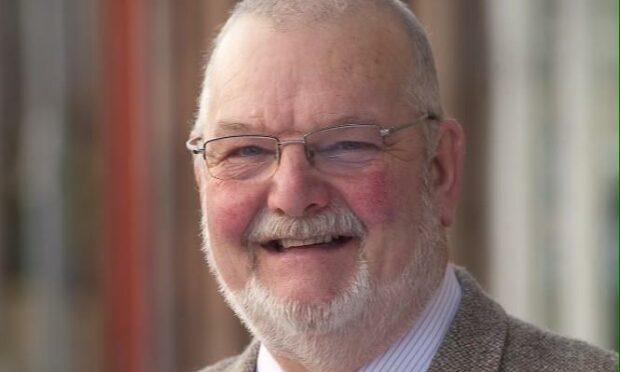David Nelson, a professional agriculturalist who spent nearly four decades at the heart of Mearns communities, has died aged 75.
He came to the area from Inverness-shire in 1985 to work at the then Glensaugh research station, near Laurencekirk.
After the Chernobyl nuclear disaster in 1986, David was involved in monitoring its impact on Scottish land and livestock.
He served on support groups for Auchenblae Primary School and Mearns Academy, was a community councillor and a Justice of the Peace for 24 years.
Rotary
David was a member of Laurencekirk Rotary Club for 35 years, a patient representative of the Scottish Ambulance Service, and a member of the Scottish Agricultural Wages Board.
He had come north from Lancashire in the 1970s and David, and his wife Barbara, worked in agriculture and tourism in Orkney and Inverness-shire before settling in the Mearns.
David was born in Eccles, Manchester, one of three children.
Polio
Aged just 10, he contracted polio. He would spend four months in an isolation hospital, his parents taking it in turns to visit, but only able to wave to him from afar.
David recovered but the virus affected the muscle structures in his leg and he would always have a limp, which made his passion for sport a greater challenge.
It did not stop him playing in goal for Newcastle University’s football team, enjoying cricket and rugby.
Lecturer
David graduated from Newcastle with a degree in agriculture and economics and began lecturing at Newton Rigg College in Penrith, where he met his future wife Barbara, who was a cook there.
When a farming job came up in Orkney, the pair saw it as an exciting adventure and married on December 29 to enable them to head north in early 1974 as husband and wife.
It was some distance from their upbringing, but the post of farm manager and agricultural adviser fed the ambition for real, hands-on farming.
Orkney
The family grew with Michael and Clare both born in Orkney, before they partnered Dutch investors in a 2,000-acre farm at Kilmartin, Glenurquhart, near Inverness in 1977.
It was a pioneering agricultural/tourism business, with hillside chalets, and an outdoor swimming pool, sauna and large kitchens around a central entertainment barn.
Barbra was able to use her cooking skills and David developed the mixed arable and livestock farm with new crops and breeds.
By night he was a popular host with games, songs and ceilidhs.
Mearns
The family remained in Glenurquhart until David’s appointment to Glensaugh in 1985. The research station would become part of the Macaulay Institute and is now part of the Hutton Institute.
David went on to join BBC Scotland’s Agricultural and Rural Affairs Advisory Committee, and featured on the Landward programme.
Television
Producer and presenter Arthur Anderson, a friend of 45 years, recalled his passion and deep insight. “No fluffs or hesitation, David always made my job so much easier.…he will be much missed by the farming fraternity.”
Professor Jeff Maxwell, formerly of the Macaulay Institute, said: “David’s contribution to agriculture research and the conflict he managed between the needs of scientists and his desire to farm well was impressive. He was a professional agriculturist with abilities in terms of stock and land management of the highest standard.”
He was a fine shot and was a shooting referee at the 1986 Commonwealth Games in Edinburgh.
Fortitude
The long-term effects of polio and bad luck meant David was rarely shy of pain from his legs.
He was run over by a tractor, injuring his strong leg, and then damaged a femoral artery falling while putting up bird boxes, which forced the amputation of the weaker leg and, ultimately, retirement, at just 55.
He remained a strong supporter of polio charities, notably the Rotary’s Polio Plus Campaign and Jaipur Limb project. The family will be making a donation to the British Polio Fellowship.
David is survived by his wife Barbara, children Michael and Clare, brother Stuart and sister Jill, and grandchildren.
